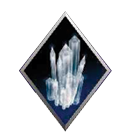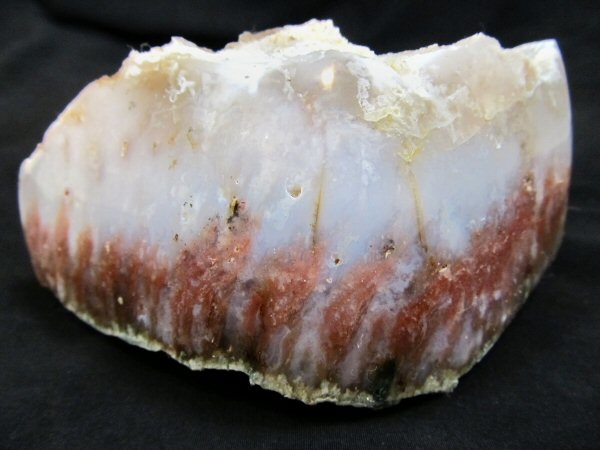
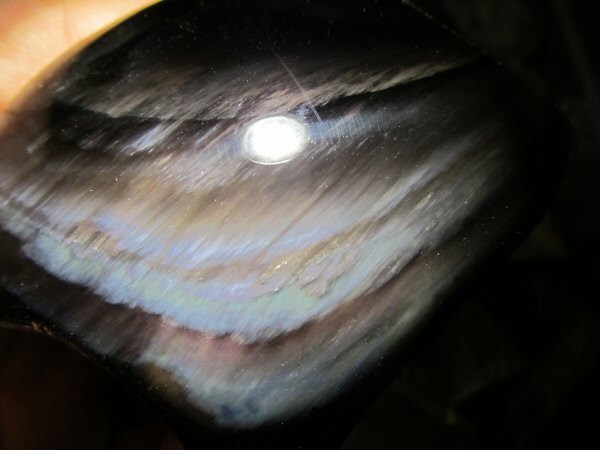
As detailed in Eastern Oregon Rockhound Ramble, Part 1, I was out in the field, thoroughly enjoying the first part of a three week rockhounding tour, organized by some Seattle friends. I joined the group at the famous eastern Oregon Glass Butte obsidian grounds, where we collected rainbow, fire, midnight lace, and other beautiful obsidian varieties.
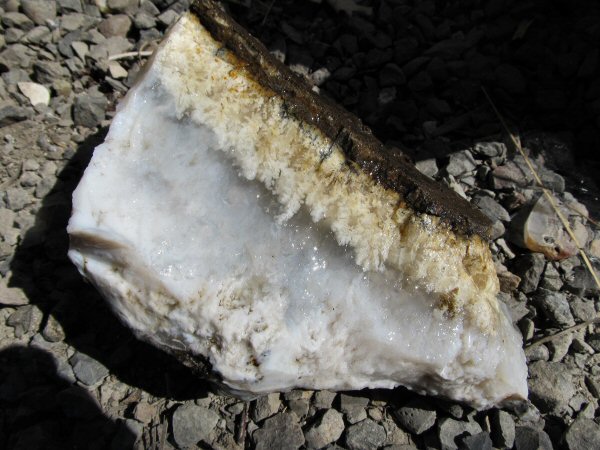
Then we moved on to a white plume agate site, in the drainage of Stinking Water Creek, near Juntura, Oregon. Here’s a large boulder of luscious white plume agate that I discovered while collecting at this prolific site. The persistent rains that had hung in the skies the whole time out, finally abated as we left the white plume site, and we decided to take a look down the Warm Springs Reservoir road. Norma McDonald, our trip navigator had some GPS coordinates for points along that road, and the area was also listed in the Gem Trails of Oregon guide.
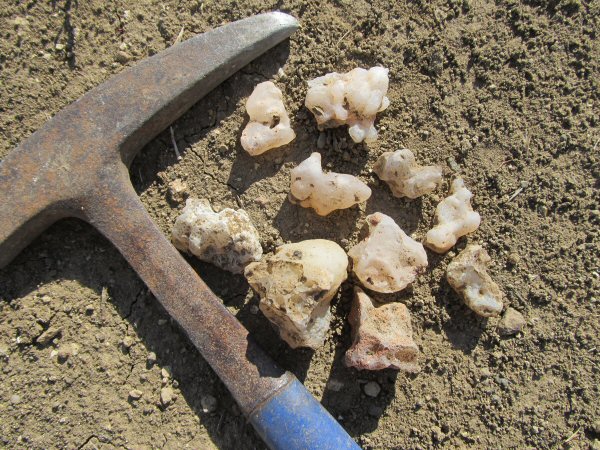
Probably we were due to strike out, after the last two awesome sites. Half of rockhounding is figuring out where things aren’t! There were some small sized, plain white agate nodules in some of the open fields and low hills adjacent to the road, as the photo shows, but nothing of any size. It was a beautiful day, transitioning out of the rains. The bright sunshine and big puffy white clouds were much appreciated after so much wet gray weather. One member of our group did find a nice little obsidian arrowhead while wandering around, so the area wasn’t completely without reward.

We only got one day of transition from the rains. The next day was full strength sun, with temps shooting up into the high 90’s. Norma had some GPS coordinates for a picture jasper site, out on the Rock Canyon Road, south of Vale, Oregon. We arrived at the spot, and our group fanned out, hiking up, and combing the sides, top, and back of this good sized hill.
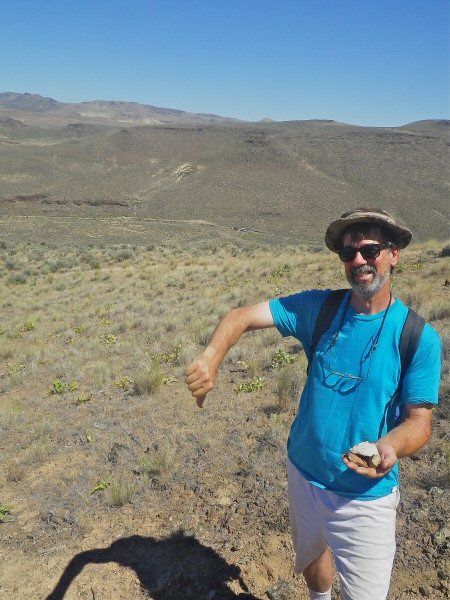
As foreshadowed in Part 1 of the Eastern Oregon Rockhound Ramble, we were skunked again. Here, I mercilessly rate the site, clutching my meager collection of incredibly scarce, leaverite style jasper, with no pattern!
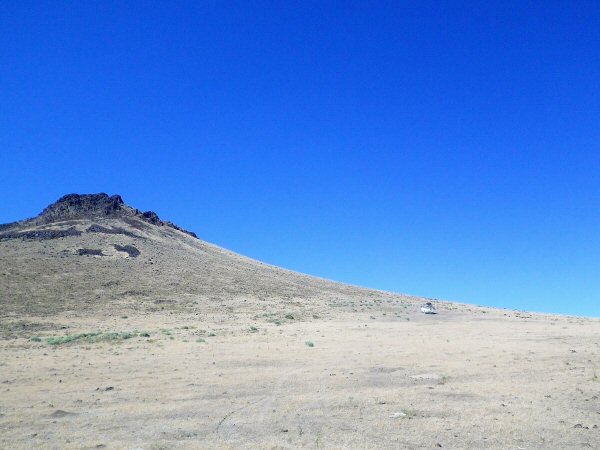
From the “Picture No Picture Jasper” site, it was about another 10 miles to the base of Negro Rock, a remote landmark, and reportedly home to some colorful, though scarce petrified wood. I had one piece of literature in my rock collecting folder that indicated that the Model A was the best vehicle to make the trip out to Negro Rock, so you get an idea of how many years this site has been on rockhounds’ radar.
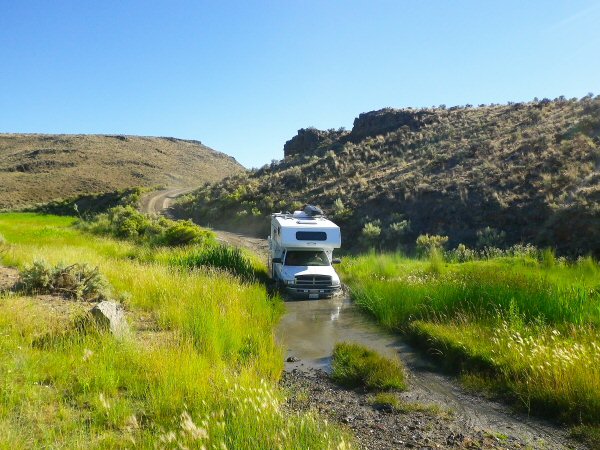
On the way out, we encounter two creek fords with water depths of up to about 20 inches – too deep for my passenger van. For a precarious moment, it looks like I am going to have to walk in – the logical consequences of bringing a low clearance vehicle out on these roads! But happily, the group softens to my plight, gear is shuffled, and I park my insufficient rig, and jump into a higher clearance, more “submersible” vehicle.
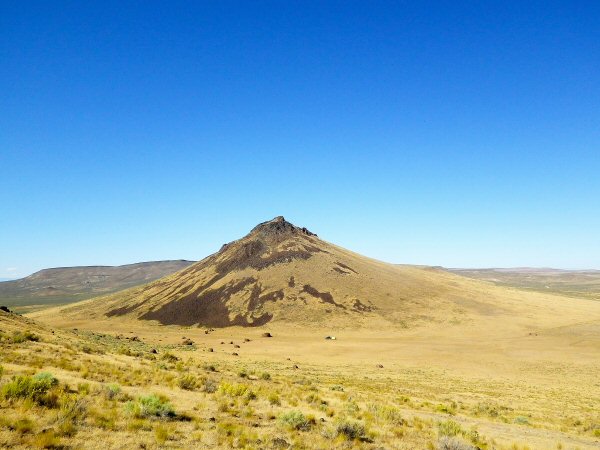
The printed guide indicates that the digs here are hard to find and that the wood is deep, at least 6-7 feet. I circumnavigated the entire hill, changing elevations up and down along the traverse, looking for any sign. Others in our group struck out in different directions, but when we reunited, the story was the same. There was no sign of any digging in the area, no real sign of any float, save for a couple chips of jasper-like material that were too small to be recognizeable as wood. I think this might be an area that you would need to plan on staying at, and digging in deeply, hoping to get lucky. Those guys that drove the Model A’s probably got most of it. Today, with heat close to 100, and no obvious sign of any sort to encourage us, except the entire bleached skeleton of a cow on the hillside, we weren’t sure we were up to it.

Several months later, I came across this slab in an old rockhound collection. It was marked as “petrified wood from Negro Rock” – beautiful material with its golds and subtle lavenders. I guess it must still be out there somewhere, in the sun baked emptiness of Malheur County, far eastern Oregon.
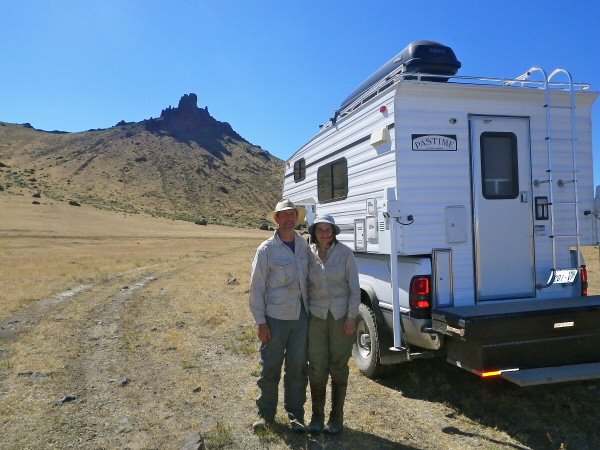
With guides, and GPS coordinates turning out to be less than optimal, we decided to rely on the good ole fashioned tribal knowledge of our rockhound friends Ken and Jeanine Metz, shown here at Negro Rock. The couple had visited a pink plume agate site in the Owyhee country, out of Nyssa, Oregon, years ago, and they said material had been abundant. In the morning, they would attempt to guide us to the site, using only their memory. This conveyance of knowledge using the rockhound oral tradition proved to be a valuable asset.
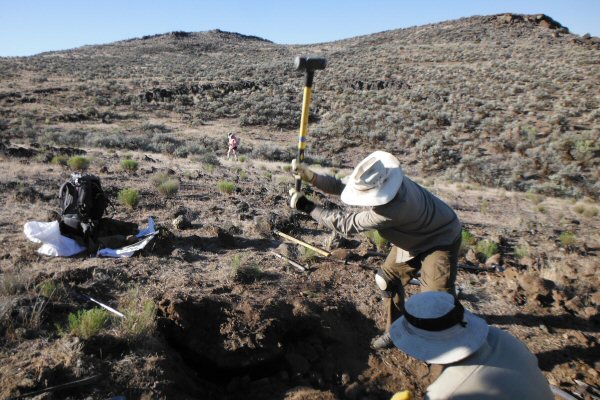
Now this is more like it! A rockhound longs only for the bright sky, the yielding earth, and the clang of steel! Ok, maybe a little Taco Bell thrown in there somewhere (wink). As we neared the base of the low “Pink Plume” hill, we saw the first signs of agate float in the road. Again, almost magically, I was only on site about 30 minutes before I discovered a big agate mass just under the soil, and it wasn’t moving. On the way back down to the rigs, to get bigger tools, I found another large chunk, poking out of a small drainage channel on the hillside.
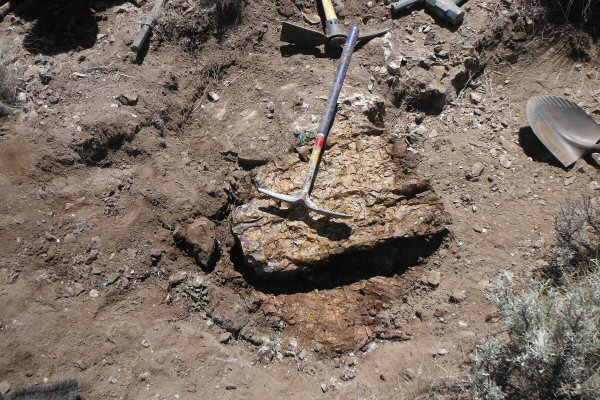
Meanwhile, Carol Rust had discovered a large knob of Owyhee jasper over on the hillside across the road from Pink Plume. Now the rockhounds had work to do! In the photo, the knob is only partially cleared off. It eventually yielded several hundred pounds of material.
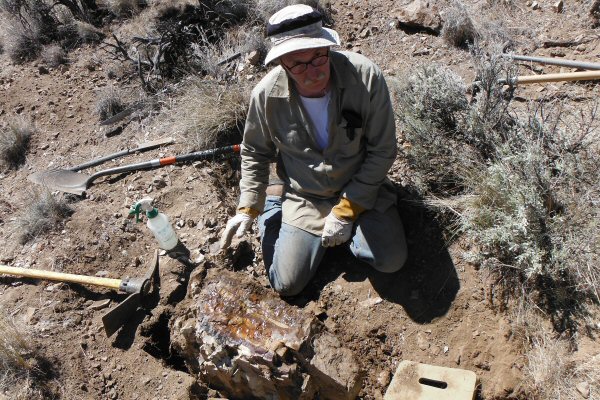
Would you put down the camera and grab a pry bar already? Here Kevin McDonald works the jasper hole, while the whole group is happily digging up the hillside in various spots. Temperatures are climbing, and nearing 100. But the fun of finding seams of agate and jasper allows the rockhound to somehow transcend physical limitations – at least for a time. We drink lots of water, and manage to stay productive and ignore the long slow build of roiling heat.
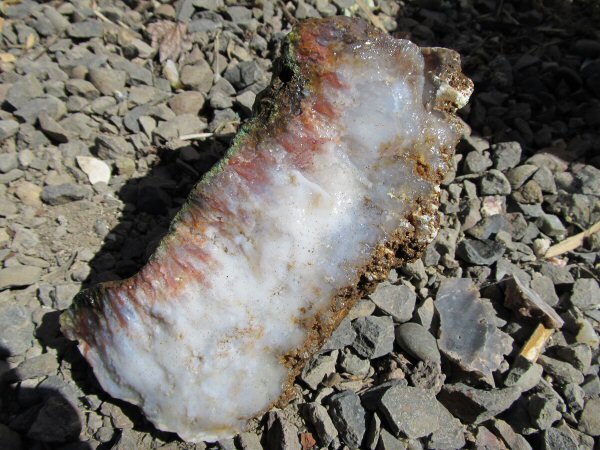
At my hilltop pink plume hole, I pull out a very nice looking 5 pound chunk with pastel pink plumes arising off a greenish base, and dancing into snowy agate. But this is just the tip of the iceberg. The rest of this nice rock comes out, and it’s a 20 pounder! The hole continues to yield good sized chunks of rock, and then the fantastic happens. Ken and Kevin dig in and pull out a giant agate boulder well over 100 pounds!
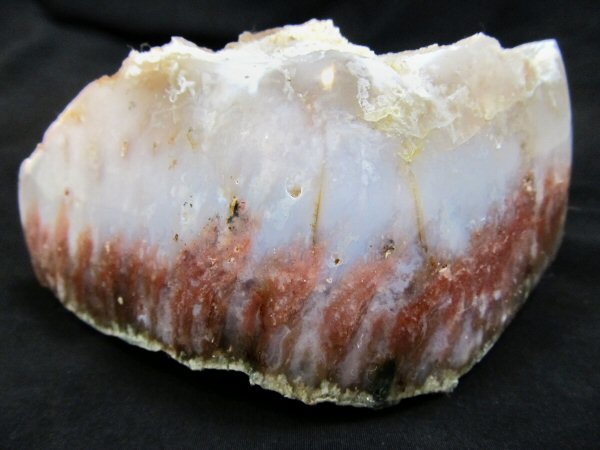
Here’s a smaller piece from the same hole, that polished up quite nicely.
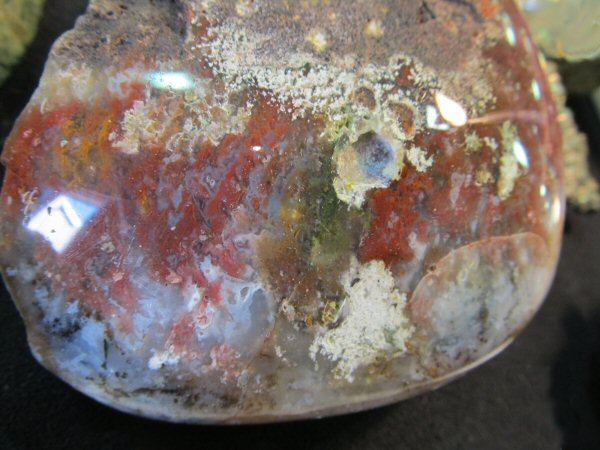
Here’s a dome-polished, hand sized piece from the Pink Plume hill float, showing some nice colors.
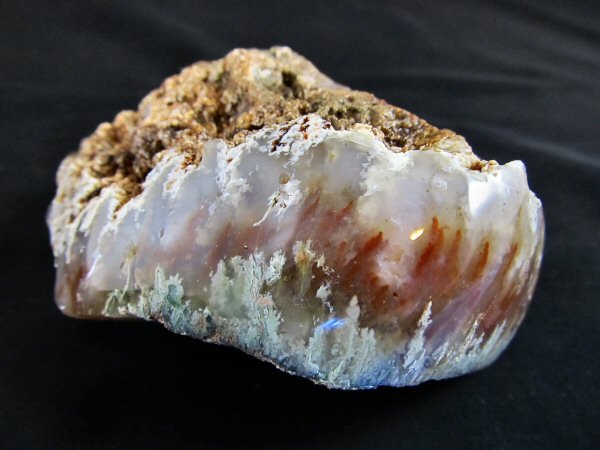
A very nice pink plume agate, with excellent patterning, representative of the best that the site had to offer.
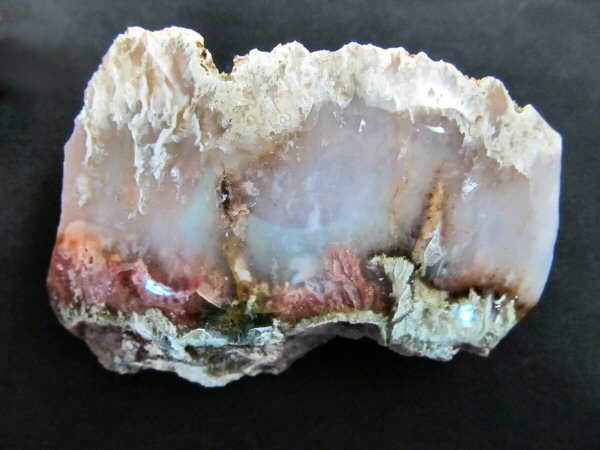
A short gallery of some additional pieces from the Pink Plume Hill site, that I worked on when I got back from the Owyhee country.
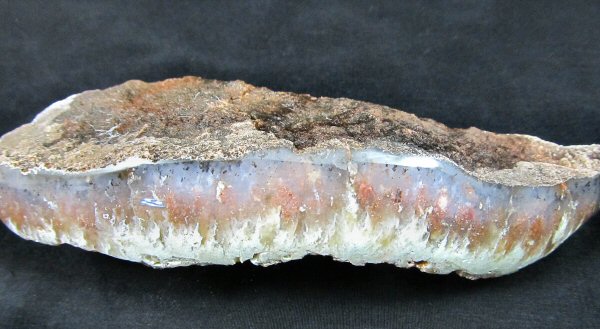
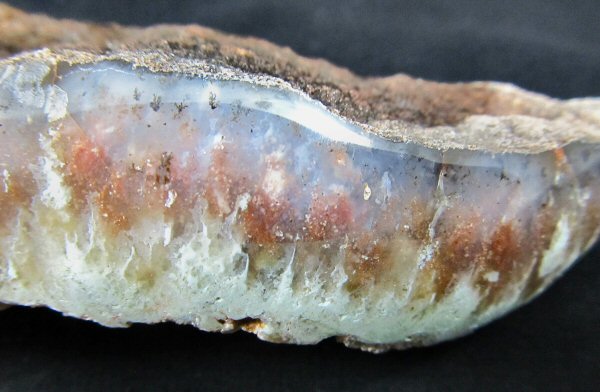
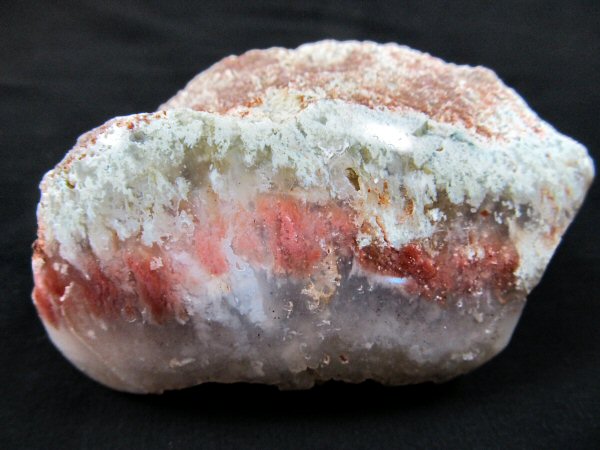
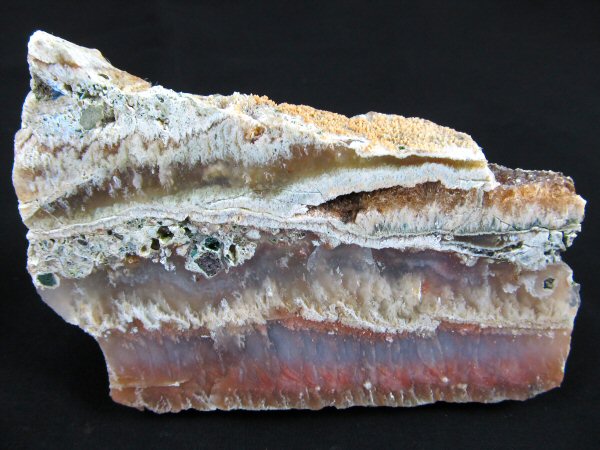
Pink Plume Parfait!
Owyhee Country! After collectively loading hundreds of pounds of material, we drive some rough roads to the canyon rims, where it’s a few degrees less sweltering, there’s an awesome “forever” view, and a nice breeze blowing. Interestingly enough, there’s a little pink plume float even way up here.
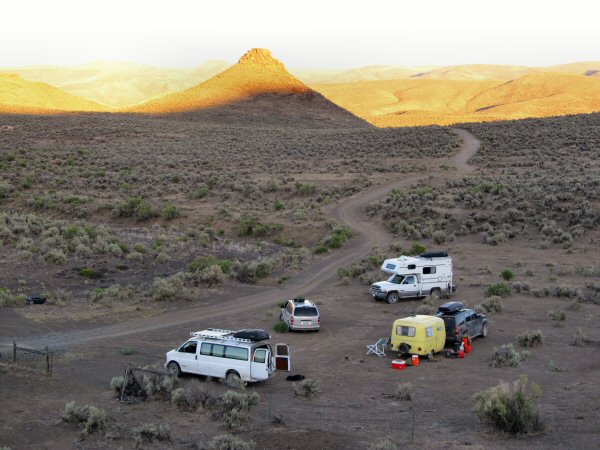
At sundown, we make camp at the bottom of a four wheel drive track that ascends to a nearby mesa where Owyhee jasper can be found. At night, temps lower a bit, to sit in the 80’s and the canyon rock and walls stay radiant with heat.
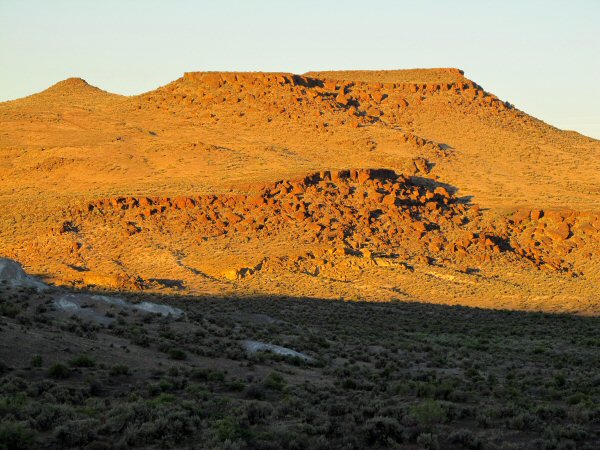
In the morning, we’ll ascend the dirt track, which pops up in the saddle to the left of this flat top mesa, and leads into jasper country.
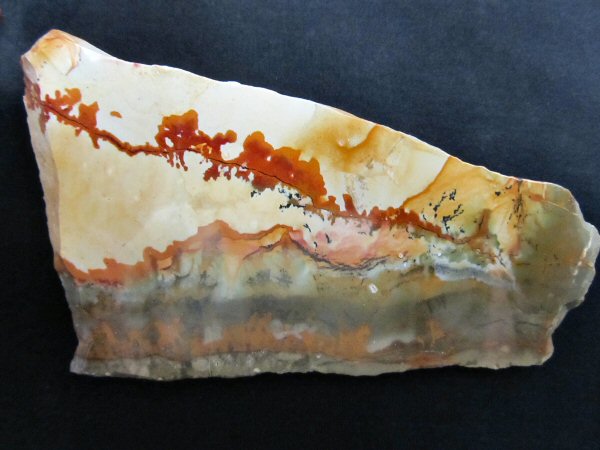
To inspire our tired group, and renew the desire for the chase, Norma McDonald brings out a color flyer she has, that features some very juicy pictures of varietal Owyhee jaspers. Here’s an example from my personal collection that I call “The Ascension”
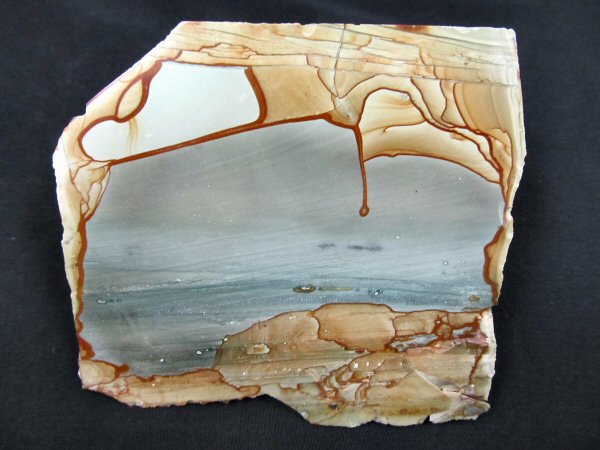
Another specimen that should be illustrative of why rockhounds comb this rugged country, in search of elusive, beautiful jaspers.
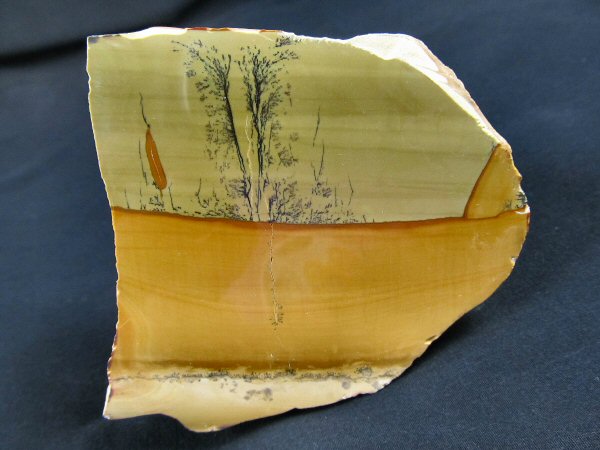
The sublime beauty of even the simple toned Owyhee jaspers.
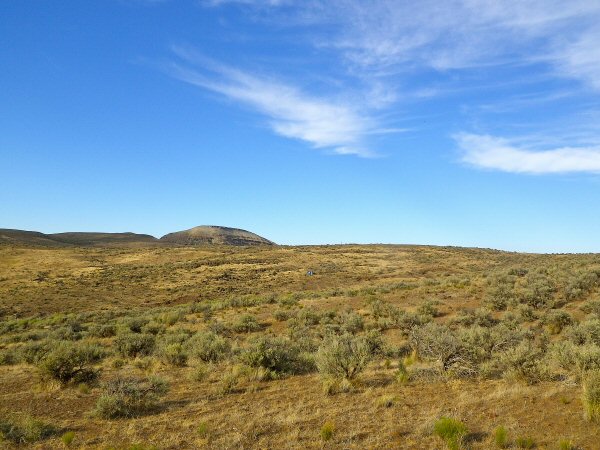
Can you spot the Owyhee Jasper dig in this picture? Hint: blue backpack marks it.
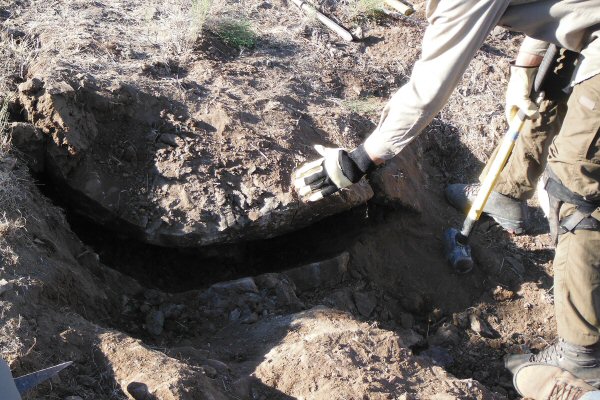
In the words of Norma McDonald: “Now that’s an Owyhee jasper seam”!
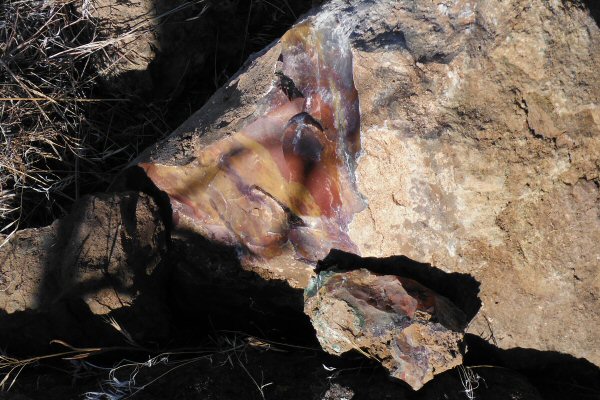
Owyhee jasper color. This seam yielded material that looked a little bit like the famous Australian mookite.
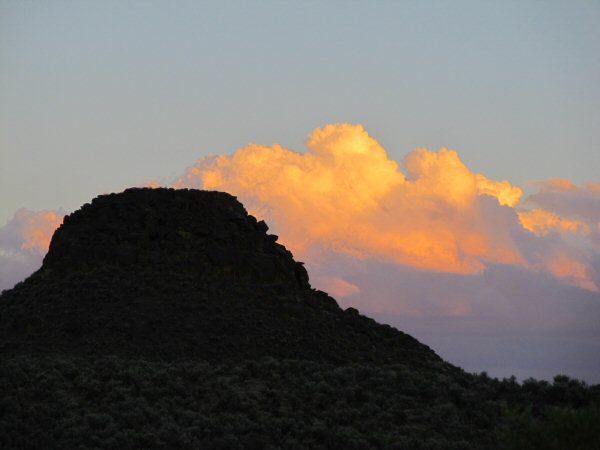
By evening the heat builds, and with it thunderheads, that threaten rain. In the middle of the night a large bank of clouds moves in, and I can see it’s filled wth lightning. I’m about 15 miles back in the rugged Owyhee country, over dirt roads that will quickly turn to mud, should the true force of these rainclouds cut loose. Reluctantly, I decide that I had better get back to pavement, rather than risk getting stuck out here, and causing the group to be delayed.
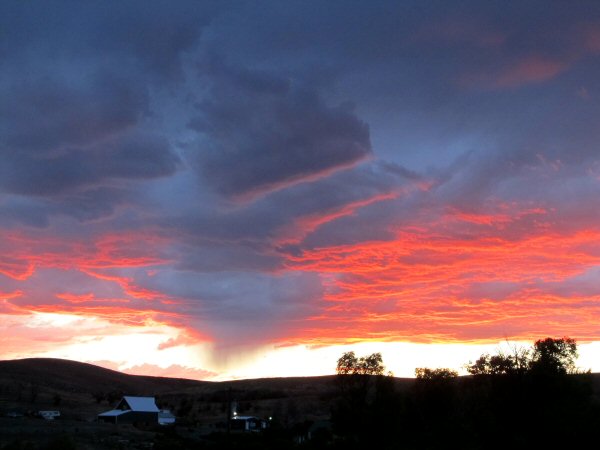
On my way out: A gorgeous sunrise, and some rain does fall. In the next couple days, a heat wave hits. Little did we know, it had been cool at 100 degrees. The daytime highs climb to a near record 113, and warnings go out in town to stay inside. Our group retreats to a hotel in Nyssa, and holes up, until things cool back down to a nice, comfortable 100!
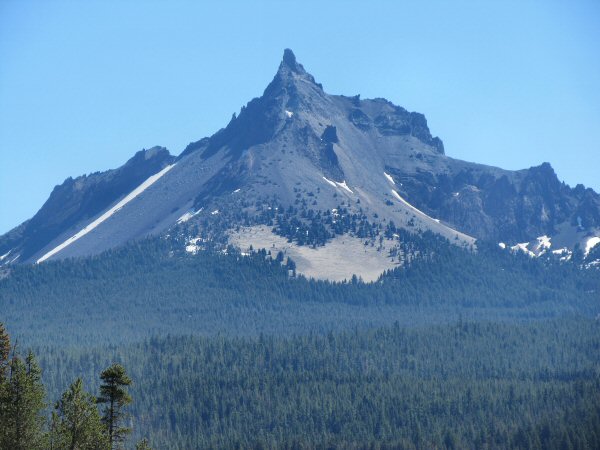
I Head for home, back over the shoulders of the Cascade Mountain Range, past the amazing ramparts of Mt. Thielson.
After the heat wave and thunderstorms, lightning set off fires in the Succor Creek area of Eastern Oregon, which burn right up to the road, and cause the rest of the group to abandon collecting plans in that region.
The group heads for camp in snakeskin agate country, near Rome, Oregon.
Collecting is still good, as you can see, even though this area has produced quantities of the whimsically shaped snakeskin agate for generations of rockhounds.
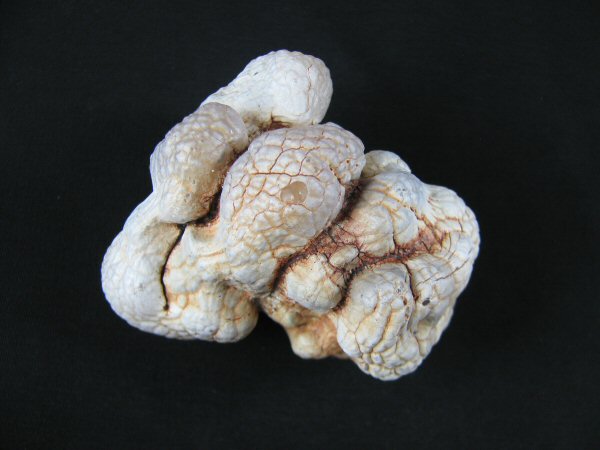
Snakeskin agate has very little to no color or pattern inside. It’s simply the fantastical shape that rockhounds can’t resist. Kevin Rust poetically comments that, “When I hit one big one underground, it was like hitting into a swarm of weiner dogs! A whole bunch showed up.”
A visit to the Purple Cow hole, near McDermitt, Nevada. This pit has produced a variegated jasp-agate that has some nice purple, amethystine areas.
Kevin McDonald finally finds some McDermitt petrified wood!
A Disaster Peak jasper hole, McDermitt, Nevada. Note the weird giant picasso concretion, leaned against the pit wall, to the right and up behind Kevin McDonald’s head.
At the Davis Creek, California obsidian area, claim owner Frank Newman shares some shade that was produced “miner style”.
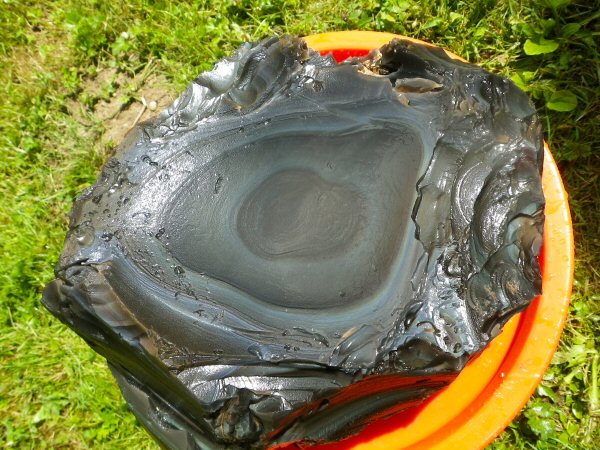
Carol Rust nicknamed this large boulder of Davis Creek rainbow obsidian “The Birdbath”.
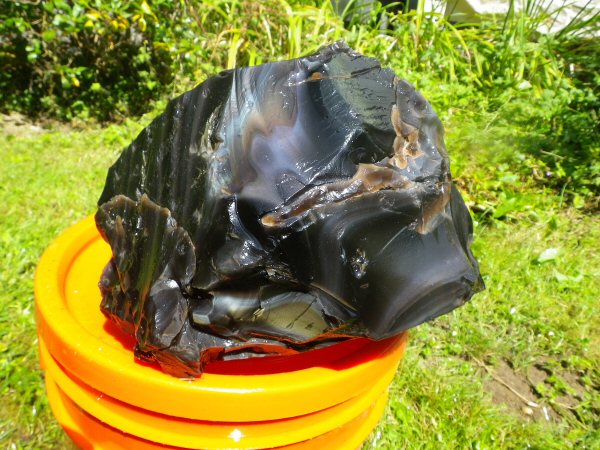
Another Davis Creek rainbow obsidian in the Kevin and Carol Rust collection. The great color and fantastic swirling pattern of the flows, really does make this material some of the best rainbow that you can collect.
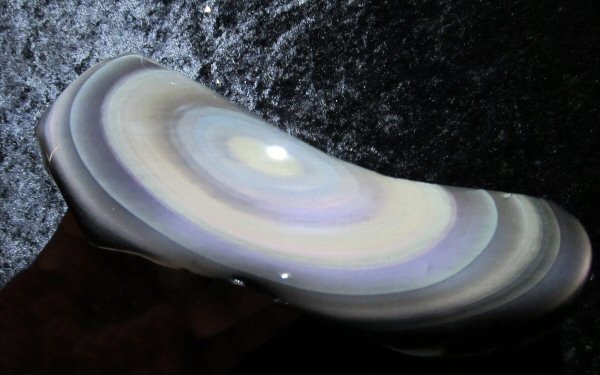
Spectacular play of colors in Davis Creek rainbow obsidian.
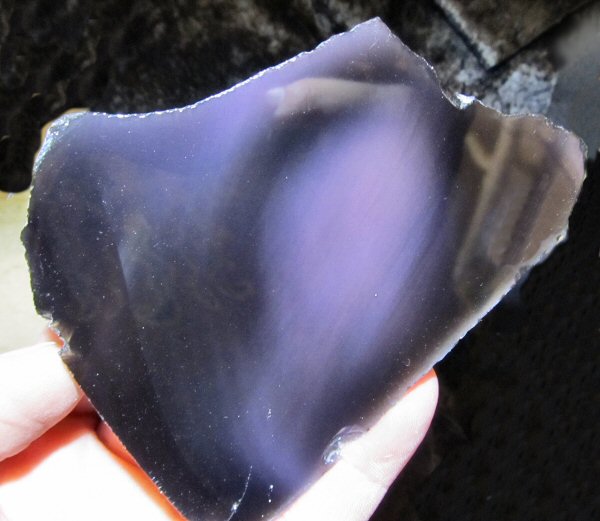
Beautiful purple sheen moves across a Davis Creek obsidian slab like the Northern Lights.
Captain, she can’t take much more! Maximum capacity has been reached. Lifespan of vehicle suspension at this rock load level: dubious. At some point, you know it’s time to head for home. I’ll hope to see everyone again on the rockhound trails!
